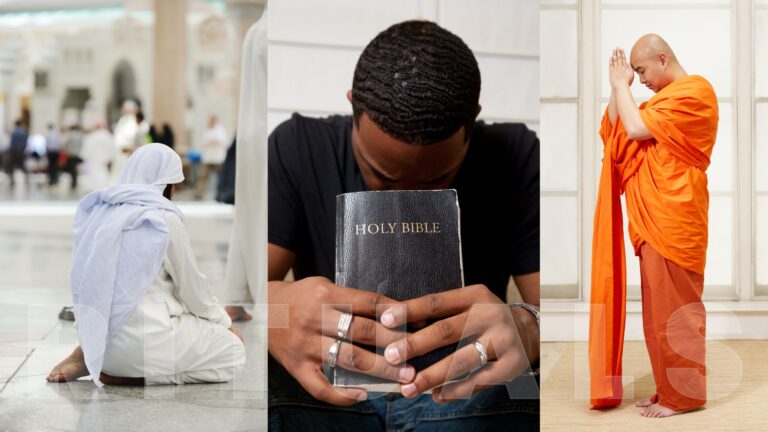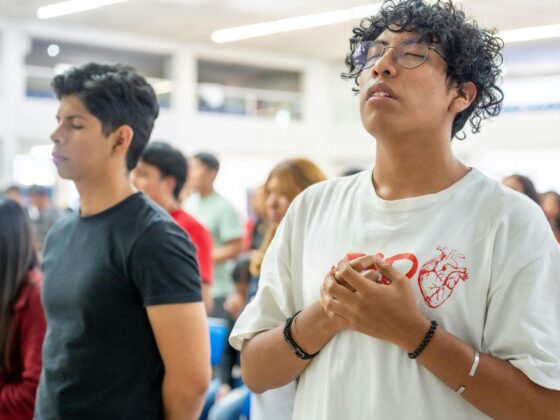Rituals: The Unseen Framework of Worldview
June 3, 2025
Worldview is more than abstract beliefs. It is lived out in worship, embodiment, symbols, and rituals. Worship directs ultimate allegiance. Embodiment reflects beliefs through habits and lifestyle. Symbols communicate meaning beyond words. Rituals, however, are where these elements take action in repeated, formative patterns. Every culture, ideology, and individual life is shaped by rituals—whether consciously or not.
For Christian educators, understanding ritual is essential. Your students participate in rituals daily. Some reinforce a biblical worldview; others subtly reshape their hearts toward competing narratives. The question is not whether rituals influence worldview, but which worldview their rituals reinforce.
Note: This article is the third in a 15-part series about the parameters of a worldview. You’ll find links to the other articles at the end of this blog post as they become available. If you haven’t read the previous worldview parameter articles, start with part 1 here: Ultimate reality.
What Makes a Ritual?
A ritual is any repeated practice that carries meaning beyond its function. Some are overtly religious, like prayer or communion. Others seem ordinary, like shaking hands or celebrating birthdays. But all rituals shape identity, reinforce values, and sustain communities.
Consider morning routines. A student who begins each day in prayer and Scripture meditation forms a different heart orientation than one who starts with social media and news. The first ritual reinforces dependence on God (Psalm 5:3), while the second may cultivate anxiety or self-reliance.
This is why biblical wisdom warns about thoughtless habits. “Do not conform to the pattern of this world, but be transformed by the renewing of your mind” (Romans 12:2). Patterns—rituals—either align hearts toward God or away from Him.
Comparing Worldview Perspectives on Ritual
To see the power of ritual more clearly, let’s compare how three dominant worldviews—Naturalism, Pantheism, and Biblical Christianity—approach rituals. Each worldview assigns different meaning and function to rituals, and those differences profoundly shape students’ hearts.
Naturalism & Secular Humanism: Rituals Without the Sacred
In a naturalistic worldview, which assumes that only the material world exists, rituals serve social, psychological, or practical functions but hold no inherent spiritual meaning. Morning routines, school pledges, or sports traditions might create a sense of identity or belonging, but they are viewed as purely human constructs.
For example, consider a graduation ceremony in a secular setting. The ritual has meaning because of tradition, but there’s no spiritual significance. The focus is on personal achievement, social recognition, and future success. This reflects Naturalism’s belief that meaning is something humans create, rather than something grounded in divine truth.
Yet, even in secular environments, rituals shape belief. The repetitive secularization of life—where God is absent from public traditions, ethics, and education—forms students’ worldview over time. Paul warned about this when he wrote: “Do not conform to the pattern of this world, but be transformed by the renewing of your mind” (Romans 12:2).
Without realizing it, students can be immersed in rituals that subtly teach self-reliance, human-centered progress, and moral relativism. If Christian educators don’t counter these rituals with biblically rooted ones, students will conform to the world rather than be transformed by Christ.
Pantheism & New Age Thought: Rituals as Self-Discovery
In contrast to Naturalism, Pantheism and New Age spirituality see rituals as tools for personal enlightenment. Since Pantheism teaches that everything is divine, rituals are about awakening to one’s own divinity rather than submitting to an external God.
Yoga, meditation, and energy-aligning practices are examples of rituals that reinforce Pantheistic thinking. The focus is on self-realization, mindfulness, and dissolving the self into the universal “oneness.”
This is radically different from a biblical view. Instead of humbling oneself before a holy God, these rituals emphasize self-deification and inward discovery. Yet, they are widely accepted—even among students in Christian schools—because they seem harmless or “neutral.”
However, God warns against rituals that lead people away from Him: “See to it that no one takes you captive through hollow and deceptive philosophy, which depends on human tradition rather than Christ” (Colossians 2:8).
For Christian educators, the challenge is clear: Students may unknowingly adopt pantheistic rituals because they seem beneficial (for example., “mindfulness” in schools), but these practices reinforce an unbiblical heart orientation. Recognizing these influences allows us to disciple students wisely.
Biblical Christianity: Rituals Rooted in Relationship
In contrast to both secular and pantheistic views, Christianity sees rituals as deeply meaningful—but only when rooted in relationship with God. Rituals don’t save, but they shape the heart when practiced in faith.
Baptism and communion, for instance, are not just symbolic traditions; they are acts of obedience that reinforce a believer’s identity in Christ. “Buried with him in baptism, in which you were also raised with him through your faith in the working of God” (Colossians 2:12).
Beyond overtly religious rituals, everyday practices—praying before meals, reading Scripture, family devotions—shape a heart that delights in the Lord. When students participate in these regular, biblical rhythms, their worldview is reinforced through action, not just intellectual belief.
Jesus Himself modeled this, withdrawing to pray regularly (Mark 1:35), attending synagogue (Luke 4:16), and sharing meals with disciples (Luke 22:19). These weren’t empty traditions; they were practices that shaped His life and mission.
If students don’t engage in biblically grounded rituals, they will adopt rituals from secular or pantheistic influences instead. The question for Christian educators isn’t just “Are our students learning the Bible?” but “What daily rituals are forming their hearts?”
How Rituals Shape Worldview in Each Perspective
Rituals do not simply reflect worldview—they reinforce it. The repetition of a practice solidifies its underlying belief system.
For a secular humanist, daily productivity rituals reinforce self-sufficiency. Morning affirmations, exercise routines, or mindfulness practices shape identity apart from God. “The fool says in his heart, ‘There is no God'” (Psalm 14:1). Even neutral habits, when framed within secularism, subtly nurture a godless heart orientation.
For the pantheist, rituals dissolve personal identity into spiritual oneness. Practices like yoga, energy work, or mantra meditation cultivate an experience of divine self-realization. Yet Scripture warns against practices that “exchange the truth about God for a lie and worship and serve the creature rather than the Creator” (Romans 1:25).
For the Christian, rituals must reinforce faith in Christ alone. Scripture calls believers to be “rooted and built up in him, strengthened in the faith as you were taught” (Colossians 2:7). Rituals like morning prayer, corporate worship, and even shared meals cultivate spiritual maturity. Jesus Himself practiced ritual, regularly withdrawing to pray (Luke 5:16) and participating in the Passover (Luke 22:19).
Now What?
If rituals shape worldview, Christian educators must ask: What rituals are forming my students? Are their daily habits reinforcing a biblical heart orientation, or are they unconsciously shaped by secular or mystical patterns?
Understanding worldview formation is essential for discipleship. If you’re ready to take the next step in understanding your students’ worldview, try our free 10-question 3DWS Mini-Quiz for School Leaders. This short, 10-question sample, drawn directly from the full 3-Dimensional Worldview Survey, offers school leaders a hands-on preview of how the survey works. You’ll get a feel for how worldview surfaces through beliefs, behaviors, and heart-level attitudes—before deciding if the full tool could serve your students well.
- What Is the 3-D Worldview Survey?
- Take the 3-D Worldview for yourself
If you haven’t yet used the 3DWS with your class, check out the 3DWS Mini-Quiz below to get started.
#biblicalworldview #christianeducation #assessingworldview
Key Takeaways
- Rituals play a foundational role in shaping worldview: Whether religious or secular, the rituals we practice regularly will deeply influence our beliefs, behaviors, and heart orientations.
- Worldview perspectives on ritual vary significantly: Naturalism, Pantheism, and Theism each understand the purpose and impact of rituals differently, shaping their followers’ lives and practices accordingly.
- Understanding and assessing rituals is crucial for spiritual formation: Recognizing the rituals students engage in can provide valuable insights into their worldview, helping leaders mentor and guide them more effectively.





